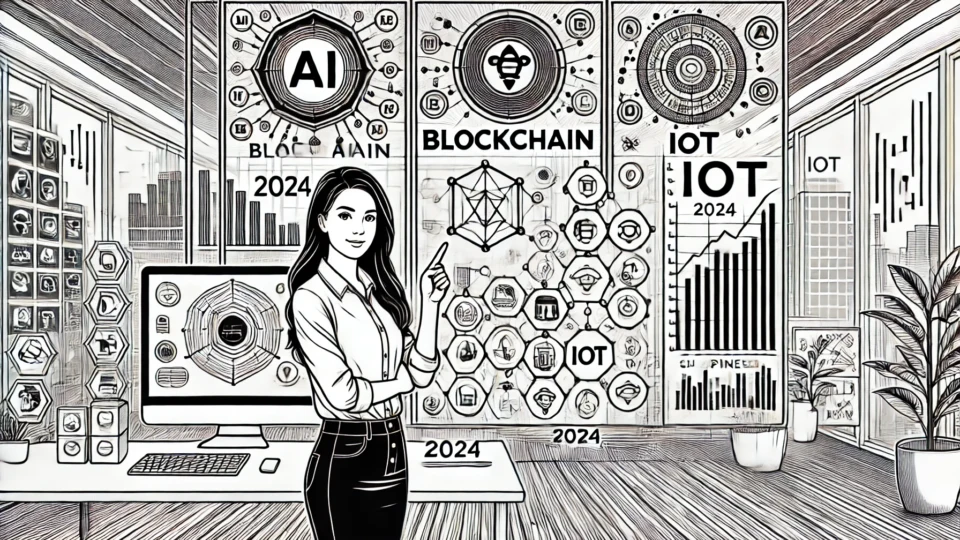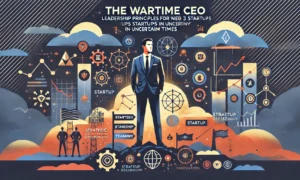As we step into 2024, the technological landscape continues to evolve at an unprecedented pace. Businesses across sectors are leveraging emerging technologies like Artificial Intelligence (AI), Blockchain, and the Internet of Things (IoT) to drive innovation, enhance efficiency, and improve customer experiences. This article explores the key trends in these technologies and how they are reshaping the business world.
The Rise of Artificial Intelligence (AI)
1. AI-Powered Automation
AI is revolutionizing the way businesses operate by automating repetitive tasks and enhancing decision-making processes. From customer service chatbots to predictive analytics, AI enables organizations to streamline operations and reduce costs.
- Statistical Insight: According to McKinsey, AI could contribute up to $13 trillion to the global economy by 2030, with businesses adopting AI technologies showing a productivity increase of 40%.
2. Personalization and Customer Experience
With advancements in machine learning algorithms, businesses can analyze vast amounts of customer data to deliver personalized experiences. This trend is especially prevalent in e-commerce and marketing, where tailored recommendations significantly enhance customer satisfaction.
- Example: Companies like Amazon and Netflix utilize AI algorithms to analyze user behavior and provide personalized product or content recommendations, leading to increased engagement and sales.
3. Generative AI and Content Creation
Generative AI is emerging as a powerful tool for content creation, enabling businesses to produce high-quality written, visual, and audio content efficiently. This technology can assist in everything from drafting marketing copy to generating images and even composing music.
- Research Insight: A report from PwC predicts that by 2025, generative AI could add up to $6.6 trillion to the global economy.
Blockchain: Transforming Trust and Transparency
4. Decentralized Finance (DeFi)
Blockchain technology is disrupting traditional financial systems by enabling decentralized finance (DeFi) solutions. DeFi eliminates intermediaries, allowing users to borrow, lend, and trade assets directly on blockchain networks.
- Market Growth: The DeFi market is projected to grow from $13 billion in 2021 to over $800 billion by 2025, according to research by Statista.
5. Supply Chain Transparency
Blockchain enhances supply chain transparency by providing a tamper-proof record of transactions. Businesses can track the movement of goods from production to delivery, ensuring authenticity and reducing fraud.
- Case Study: Companies like Walmart have implemented blockchain solutions to track food products, enhancing safety and trust among consumers.
6. Smart Contracts
Smart contracts automate and enforce agreements between parties without the need for intermediaries. This technology streamlines processes and reduces costs associated with contract management.
- Statistical Insight: According to a report by Deloitte, 39% of organizations are considering implementing smart contracts in their business processes within the next 12 months.
The Internet of Things (IoT): Connecting the World
7. Enhanced Data Collection and Analysis
The proliferation of IoT devices has enabled businesses to collect vast amounts of real-time data. This data can be analyzed to gain insights into customer behavior, operational efficiency, and market trends.
- Industry Impact: According to Gartner, the number of connected devices will reach 25 billion by 2024, generating a wealth of data for businesses to leverage.
8. IoT in Smart Manufacturing
Smart manufacturing utilizes IoT technologies to enhance production processes, reduce downtime, and improve product quality. By connecting machinery and equipment, businesses can monitor performance in real time and make data-driven decisions.
- Example: Companies like Siemens and GE are leading the way in implementing IoT solutions in manufacturing, resulting in significant cost savings and productivity gains.
9. Smart Cities and Infrastructure
IoT is playing a crucial role in the development of smart cities, integrating technology into urban infrastructure to improve sustainability, efficiency, and quality of life for residents. From smart traffic management systems to connected energy grids, the possibilities are endless.
- Research Insight: A report by MarketsandMarkets predicts that the smart cities market will grow from $410 billion in 2020 to $1,034 billion by 2026.
Conclusion: Embracing the Future
As we navigate the technological landscape of 2024, AI, Blockchain, and IoT stand out as transformative forces shaping the future of business. By embracing these emerging technologies, organizations can drive innovation, enhance operational efficiency, and improve customer experiences.
To stay competitive, businesses must invest in these technologies, adapt to changing market dynamics, and foster a culture of innovation. The future is bright for those willing to embrace the possibilities that AI, Blockchain, and IoT offer.
Disclaimer
Posts in the Notebook are written by individual members and reflect personal insights or opinions. Please verify any information independently. If you have any concerns, notify the admin immediately so we can take action before any legal steps are taken.





